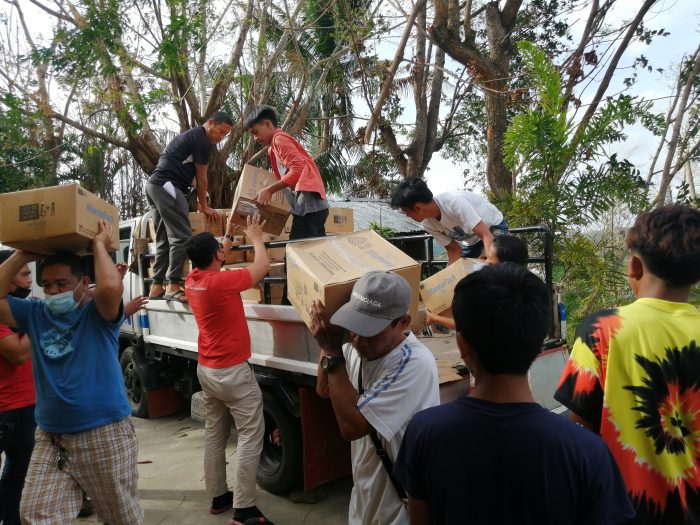
Manila, 8 February 2022 – International Care Ministries (ICM), a non-profit organization working with the ultra-poor in Visayas and Mindanao, held a virtual launch on 8 February 2022 for its Recover Program for the survivors of Typhoon Odette (International name Rai) attended by government agencies, local government units, and private and corporate foundations.
The Recover Program is the next stage of ICM’s typhoon relief and recovery efforts that have, to date, reached over 65,000 families with nearly 3 million meals, drinking water, and other necessities, as well as building funds and materials for homes and churches in their communities.
“It’s stunning to realize that any one of those provinces would be quite a massive disaster response, but to have all of them happen at the same time in all ICM areas has been overwhelming for us,” ICM’s CEO David Sutherland said after he recounted ICM’s relief efforts in seven of the provinces affected by the super typhoon. Thanks to ICM’s partners and donors, the organization was able to send supplies. But because of the scale of the damage, it’s not nearly enough.
In the next six months, ICM’s Recover Program aims to reach 150,000 Filipinos to help families heal from the trauma brought about by this natural disaster and to help them build resilience for the challenges ahead. The 6-week training program is designed with the goal of helping survivors get back on their feet, restart their businesses, savings, and income-generating activities.
As part of ICM’s Recover Program, qualified participants will receive individual and savings group cash grants. The grants come with training on how to use the funds to help them get their livelihood back on track. “This is all part of ICM’s philosophy, that with the right support small amounts of cash or material benefits can make strong incentives to create habits for the ultra-poor to get themselves out of poverty going forward,” Sutherland explained.
The Recover Program also integrates a Trauma Healing course. Developed by the Trauma Healing Institute (powered by the American Bible Society), the course has been used to help millions of people from war-torn countries as well as in communities recovering from poverty and natural disasters. The program creates safe places for groups of people to help each other heal. It uses stories, activities, art, and questions to help them engage deeply with themselves, with their faith, and with each other.
Partnerships and collaborations
ICM shared its plans for the Recover Program with the goal of building partnerships for this endeavor and to coordinate with other responders to benefit the most affected communities.
“The objective of this launch is not just to share our plans and strategies, but more importantly to extend an invitation to collaborate and coordinate efforts, to leverage each other’s resources, and to learn from our distinct expertise and shared experiences,” Charis Raya, ICM’s Director of Strategic Partnerships.
ICM will deliver the Recover Program to 750 communities in ten of its branches, starting from March to the end of July. There are a projected 22,500 families who will benefit from the Recover Program — over a hundred thousand Filipinos. This is a major undertaking for the organization, requiring over a hundred local staff onsite with the support of over 50 of ICM’s national staff, and 4,500 volunteers.
Throughout the Recover Program, ICM will collect and share its data and evaluations for ongoing strategies moving to longer term recovery and resiliency.
The Long Journey to Recovery
The plight of families living in ultra-poverty was already dire before the typhoon. The average ultra-poor person survives on a daily income of US$0.28 (Php 14.40) – barely enough to eat three meals a day.
ICM has graduated more than 1.5 million Filipinos living in ultra-poverty from its four-month Transform program. Transform provides training for livelihood, health, education, and values. ICM’s extensive research shows that there are improvements in the participants’ income (up by 107%), health (36% reduction in illness), and family life satisfaction (up by 16%) after Transform. But after the supertyphoon — as is the case whenever a natural disaster strikes the ultra-poor — whatever progress they had made is largely wiped out.
ICM operates in ten areas across the 11 regions affected by Typhoon Odette. Both ICM staff, and the communities that the organization has worked with for years have witnessed firsthand the destruction of Typhoon Rai in their own homes and livelihood.
ICM was able to immediately reach thousands of families with relief as soon as the typhoon passed, because of the strategic location of the organization’s bases and its partnerships with community pastors in the affected provinces — particularly in Bohol, Cebu, Palawan, Leyte, Negros Oriental, Negros Occidental, Bacolod, Dumaguete, and Surigao, where ICM had been preparing to open a base soon before the super typhoon hit. ICM’s proximity and its supplies of food packs on hand enabled its staff to reach many of the remotest communities even before the roads had been cleared.
The extent of Typhoon Odette’s devastation to the lives, livelihood, and property of the poorest is both deep and wide, and so the relief, recovery, and rebuilding efforts that meet it must be also.
ICM welcomes partners from public and private organizations, whether in-kind (goods or services) or technical programs to reach more communities in need.
To partner with ICM for the Recovery Program, email ICM Strategic Partnerships (strat-par@caremin.com).
To learn more about ICM’s programs and to make a donation towards the Typhoon Odette response, visit caremin.com/odette-response.
